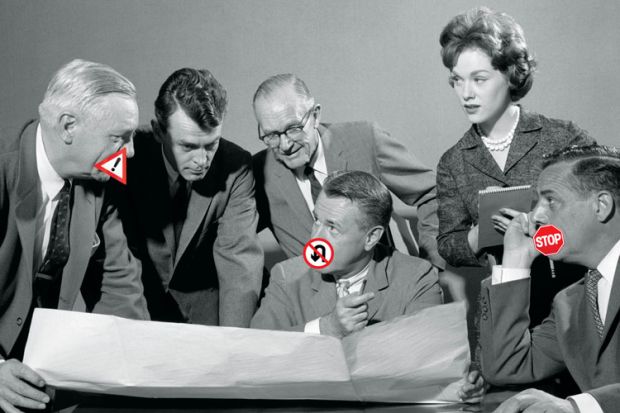When I was a visiting academic at Stanford University in the mid-1970s the game of laureate spotting was a common practice. I don’t know how many Nobel prizewinners were then on the campus – the claim now is 21 – but there were plenty about. The biggest spot was Linus Pauling and I always seemed to be meeting people who had “nearly” just been run down by him while he rode his bike. Nobody seemed able to believe that a man who had two Nobel prizes could possibly be a competent cyclist.
Perhaps the rarest spot in this game was William Shockley, joint winner of the physics prize for 1956. Shockley was honoured for leading the team that invented the transistor, but he had earlier been involved in the development of radar. He had also been commissioned by the US War Department to calculate the costs of defeating Japan by conventional means and his very high estimates were probably crucial in influencing the decision to drop the atomic bombs on the country. Shockley was an important man, but he was also a eugenicist who believed that it was vital for the future of our species that we institute programmes of incentivised sterilisation to maintain the level of human intelligence. He always denied being a racist because he said that he lacked any a priori hostility to any race, but it was also clear that more black people than white would be affected by the policies he was prescribing.
Shockley was just making the transition from full-time professor to emeritus when I arrived. He cut a lonely figure. Stanford was in some ways at the forefront of what came to be called political correctness and a bitter dispute was breaking out about the university football team’s name, the Indians. (It was replaced by the innocuous Cardinals.) He paid a high price for his opinions: a price that was, perhaps, easy to extract because he was a rather austere and charmless person. It is said that his children read of his death (in 1989) with indifference. In my opinion, as in that of many other people, he made unjustified assumptions about the primacy of nature over nurture and was naive in his acceptance of the concept of IQ. But Shockley expressed his opinions in the proper forums for expressing opinions and he did so in a calm manner. He believed that he had a right to such expression and it was accorded to him: there was no attempt by the university to dissociate itself from him; his opinions were not assumed to represent the university as such. That is how it should be. He was protected by the US Constitution, by his status and possibly by the need to appease wealthy members of the alumni who tended to be less progressive than those on campus. But I think we should always accord that right in a full and unconstrained way.
The principal of freedom of speech as espoused by John Stuart Mill brooks no exemptions in terms of the pure content of what can be expressed. If we are to progress and enhance knowledge we must be open to ideas however offensive or preposterous we or anyone else might find them. A good rule of thumb is that any seriously interesting proposition should be offensive to somebody. I’m not sure that I agree with Lord Northcliffe’s reputed saying that news is only news if it hurts somebody, but I do accept the corollary that ideas are truly important only if they offend someone. Free speech is incompatible with the existence of any authority that is allowed to define the preposterous or offensive a priori. That is what makes us modern rather than medieval. I am inspired in my commitment to an extreme view here by decades of observation of the human capacity for believing false and absurd propositions. Fifteen years ago, I thought that the introduction of the euro as proposed fell into the preposterous category, meaning that I thought only a moron could believe it would work for the better. But most educated people didn’t seem to see it that way. I am old enough to remember when the idea of same-sex marriage seemed preposterous. What matters most about free speech is that we must always allow the unfashionable and apparently ridiculous to have their say. In particular, students should be subject to the widest variety of arguments.
The reason that I am reiterating these liberal orthodoxies is that they no longer seem to be established in the way that they were and this year I have experienced my own small-scale Shockley moment. In January, I expressed an opinion in a radio interview in which I said that Ched Evans, a footballer who had been convicted of rape and served a term in prison, should be allowed to continue his career, as many other professional sportsmen had been allowed to do. I said that the law of rape was flawed and more given to unsafe convictions than many other laws. I also argued that it was absurd to hold professional sportsmen up as moral exemplars. I was described as a “visiting professor at the University of Brighton”. Strictly speaking, this was false: I had held that position for 12 years but had officially retired from it the previous September. The local paper in Brighton picked the story up and published an unbalanced report of what I had said without consulting me. I was, apparently, reviled on “social media”, described as an “idiot” and “disgusting”. I have no problem with that (and no access to social media): free speech is for the badly informed as well. But officials of the University of Brighton were also involved in contacting various organisations that listed me as connected with them to remove any reference to Brighton from their profiles of me: these included Standpoint magazine and Pembroke College, Cambridge. The proposal that I retain a loose connection by being awarded an honorary professorship was, of course, dropped.

I found all of this pretty silly, but also slightly sinister. In fact, the university might well have taken exception to me a decade earlier. I have always been doubtful about drug regulation in sport and published an article condemning it (in The Guardian in 2004, but it was syndicated in many other places and there was protracted interest from other media). Very briefly, I argued that sport would be fairer, more honest, safer and more useful to society if doping were legalised – and also that people could make more rational choices between sports both as participants and spectators. Brighton is a major centre for the study of sport, but like most places that study sport, it does little to remedy the deficit of criticism of official doctrines. The study of sport in universities should be challenging the sports councils and the international sporting organisations, not falling within their parameters and accepting their research money. Brighton has a declaration against doping that everyone is supposed to sign and prides itself on its drug detection research. But my views on drugs never had what I will call the Ratner moment.
The high-street jeweller Gerald Ratner memorably came to grief in 1991 when he said that he had made his money out of selling “crap”. But contrary to popular belief, his problem was not so much that he said it but that The Sun reported it on the front page. He had said it many times and it had even been a headline in the Financial Times, but FT readers know there’s money in crap and didn’t shop at Ratners. The Ratner Effect occurs because we live in the opposite world to Orwell’s nightmare vision of a state monopoly of information and ideas; we are overloaded with stuff and someone has to define your idea as an issue to set up a conflict that will be noted. That was the difference between the treatment of my two “idiotic” opinions, and it makes the Stanford-Brighton comparison instructive: you can be a bastion of inoffensiveness or a proper university, but not both.
My long-term employer, the University of Warwick, comes off quite well out of this. I don’t know whether anyone kept score, but I may have been the most-complained-about person in that institution. There is no space here to list the many issues and there were many outlets, with New Society and The Daily Telegraph being the most frequent. When I had succeeded in offending people, the various representatives of the university responded properly by saying it was my opinion and that I was entitled to express it while in their employ without their having to approve it in any sense. I certainly wasn’t ostracised. I might have suffered in terms of promotion (I was turned down several times), but the leaks from the mysterious Promotions Committee suggested that it was my willingness to sound off about almost anything other than the subject I was listed as lecturing on that was held against me rather than any particular content.
Sadly, I think it has become increasingly difficult to behave as I did. Members of the current generation of academics are constrained by lack of tenure, research pressure and a vague culture of hard work and conformity. Those with power in universities want greater conformity because of image concerns, overseas students and many other sources of stress. It’s difficult to criticise China when the People’s Republic sends you 2,000 lucrative students and it’s difficult to criticise Islam full stop. The sacking of Arnold Toynbee from his University of London chair in 1924 for his pro-Turkish sympathies was the result of a kind of tension that is now mainly internalised.
So I do think we must reiterate and reinstate the primacy of academic freedom – and banish the kind of behaviour that Brighton showed to me, not least because academic freedom is going to be the only kind of effective freedom in many cases. Academic freedom can be regarded as avoiding many of the complex philosophical questions that surround the concept of freedom in its broader meaning (such as whether drug habits or religious beliefs are part of the person or internalised constraints upon the person) because it is about (relatively) rational adults. But there does remain the distinction between speech and action, remembering Mill’s contrast between arguing against the Corn Laws and making a speech about them to a drunken mob in front of a corn dealer’s house. The freedom I am defending is propositional: it favours saying things in the fullest and calmest manner possible: television debates are all right, but not with an audience present. It does not extend to the person or persons who took a spray can to my office once after an article I wrote, nor to demonstrations that block the highway. It is, therefore, unashamedly “elitist”: there is no hint in the classic liberal argument about freedom, truth and progress that such freedom can be equally exercised by everybody.
Lincoln Allison is emeritus reader in politics at the University of Warwick and was visiting professor in the politics of sport at the University of Brighton from 2002 to 2014.
University of Brighton comment
A spokesperson for the University of Brighton said: “The issue with Professor Allison’s comments about the convicted rapist Ched Evans, for us, was not a question of academic freedom, but a matter of Professor Allison being inaccurately presented in the media as a representative of the University of Brighton. He is not. Professor Allison is not employed by the University of Brighton and the board that awards the title of honorary professor has never considered him for that title.”
后记
Print headline: Check your privilege




